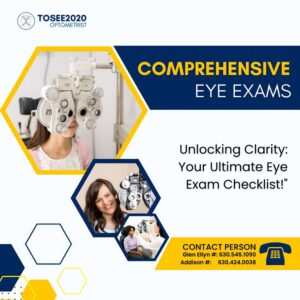Choosing the Best Family Eye Doctor: Your Path to Optimal Wellness.
Good vision is a precious gift that significantly impacts our daily lives. From the youngest members of your family to the oldest, maintaining healthy eyesight is crucial. To achieve this, it’s essential to find the perfect eye doctor who can address the unique needs of each family member. In this comprehensive guide, we’ll explore the importan ce of eye care and the different types of eye doctors and provide practical advice on selecting the ideal eye doctor for your family’s vision needs.
ce of eye care and the different types of eye doctors and provide practical advice on selecting the ideal eye doctor for your family’s vision needs.
The Importance Of Eye Care:
Understanding the significance of regular eye care is the first step in ensuring the well-being of your family’s vision. Our eyes are the windows to our souls and our primary source of information about the world around us. Vision problems can significantly impact academic performance, safety, and overall quality of life. Annual eye exams are crucial for detecting and addressing vision issues early, preventing potential complications, and maintaining optimal eye health for your family.
Types Of Eye Doctors:
Eye care involves a range of specialists, each with a unique focus. Understanding the roles of different types of eye doctors is vital when seeking care for your family:
Optometrists: Primary eye care providers perform eye exams, prescribe corrective lenses, and diagnose and treat common eye conditions.
Ophthalmologists: These medical doctors are trained to provide comprehensive eye care, including cataract removal and LASIK surgeries. They can also diagnose and treat a wide range of eye diseases.
Pediatric Ophthalmologists: Specializing in children’s eye care, these doctors are skilled in diagnosing and treating eye issues in kids, including amblyopia (lazy eye) and strabismus (crossed eyes).
Orthoptists: Orthoptists focus on diagnosing and treating eye movement disorders and vision problems related to eye muscle coordination.
Opticians: Opticians are not doctors but are trained to fit and dispense eyeglasses and contact lenses based on prescriptions provided by optometrists or ophthalmologists.
Assessing Your Family’s Needs:
Before choosing an eye doctor, assessing your family’s specific vision needs is essential. Consider factors such as age, existing eye conditions, and any other special requirements. For example, a pediatric ophthalmologist may be the best choice if you have a child with a known vision issue. An optometrist might suffice if you’re looking for routine eye exams and prescription glasses. Understanding your family’s needs will guide you in finding the right specialist.
Research and Recommendations:
Start your search for the perfect eye doctor by seeking recommendations from family, friends, or your primary care physician. Personal referrals often provide valuable insights into a doctor’s bedside manner and competence. Additionally, research potential eye doctors online, read patient reviews and check their credentials and affiliations with reputable medical organizations like the American Academy of Ophthalmology or the American Optometric Association.
Verify Credentials and Experience:
Once you’ve identified potential eye doctors, take the time to verify their credentials and experience. Confirm that they are licensed to practice in your state and check for any disciplinary actions or malpractice claims. Evaluate their education, training, and years of experience, particularly in dealing with conditions that may affect your family members.
Consultation and Compatibility:
Schedule consultations with your shortlisted eye doctors to assess their compatibility with your family’s needs. Pay attention to the doctor’s communication style, willingness to answer questions, and ability to put your family at ease, especially if you have young children or individuals with anxiety about eye exams. An eye doctor who establishes rapport and instills confidence can make the entire eye care experience more pleasant.
Technology and Services:
Advancements in eye care technology have transformed the field, enabling earlier diagnosis and more precise treatments. Inquire about the technology and services offered by potential eye doctors. A well-equipped practice can provide more comprehensive care and better outcomes for your family. Additionally, consider the location and convenience of the practice, as easy access to eye care can encourage regular visits.
Insurance Coverage and Payment Options:

Understanding insurance coverage and payment options is essential to ensure eye care is accessible and affordable for your family. Verify that the eye doctor accepts your insurance plan and inquire about any out-of-pocket costs. Some practices may offer flexible payment plans or accept various forms of payment to accommodate your budget.
Pediatric Eye Care:
Children have unique eye care needs, so finding an eye doctor specializing in pediatric care is crucial. Pediatric eye exams can detect issues like amblyopia or strabismus, which, if addressed early, can prevent long-term vision problems. A pediatric ophthalmologist or an optometrist experienced in working with children can make the eye care experience comfortable and effective for your little ones.
Regular Eye Exams and Follow-Up:
Once you’ve selected the perfect eye doctor for your family, schedule regular eye exams according to their recommendations. Routine check-ups help monitor eye health, detect issues early, and update prescriptions as needed. Also, establish a follow-up appointment plan if any family member has a known eye condition or requires ongoing treatment.
Conclusion:
Finding the perfect eye doctor for your family is vital in safeguarding their vision and overall well-being. With the right specialist, you can ensure that your loved ones receive the highest quality eye care, from early childhood through adulthood. By assessing your family’s needs, conducting thorough research, and prioritizing factors such as credentials, compatibility, technology, and insurance coverage, you can embark on a journey to optimal eye health, knowing that your family’s vision is in capable hands.
